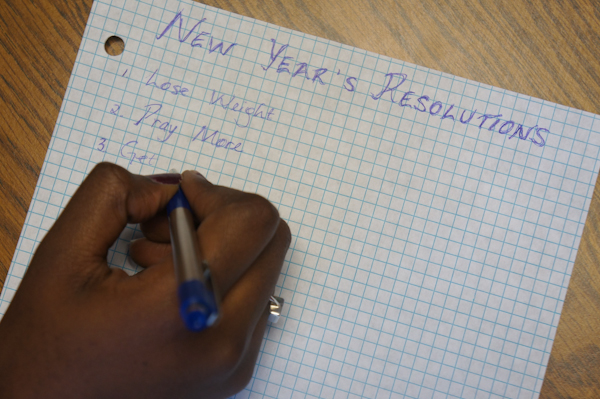Photo by: Henoc Kivuye
With the turn of a new year, many people are making changes in their lives. New year’s resolutions are a common tradition involving dedication to a better self.
“It is a new year, new beginning, fresh start, out with the old in with the new,” sophomore Janey Weast said. “I would say [a resolution] is a decision you would make that you are aware of to do something differently. It gives me something to work toward throughout the year.”
Regardless of the resolution, most people will find it difficult to follow through, according to Professor of Psychology and Family Studies Tina Winn.
“You’re using up your resources, your psychological strength,” Winn said.
Habits can be hard to break, and new year’s resolutions deal directly with forming and breaking habits.
“It takes time to break old habits and build new ones,” Winn said.
Nearly all resolutions include the creation of a new habit, but some also involve destroying an old one. Habits form subtly through everyday life and do not always stand out.
A habit can be as simple as a person’s stance while they brush their teeth, or something as encompassing as the way they spend their time each day. Procrastination is a habit, and changing a deeply-ingrained habit to replace it with something new can be difficult.
“Willpower has been shown to be a limited resource that we have,” Winn said. “The more we resist something, the more we have to use our willpower, the more we kind of use it up.”
It is important to use willpower wisely; the more it is used, the stronger it becomes. If one uses his or her willpower too quickly, it becomes vulnerable and easy to break, according to Winn.
“The more we practice [using willpower] the easier it’ll get, but we need to give ourselves breaks from it,” Winn said. “We’ve got to understand that it’s not unlimited – we can’t resist everything in the world. We need to give ourselves other positive things to kind of restore that strength, so we have willpower to use on the things that are most important.”
Some resolutions prove harder to keep than others. Often, when a resolution is made for a reason other than one’s own personal interest, the goal is not met.
“Things that are personally meaningful, things that work well, that person’s own intrinsic motivations and things they enjoy: those are going to be easier to follow through with than resolutions that were trying to please someone else,” Winn said. “Those are really hard.”
Another potential difficulty in keeping a new year’s resolution is one that applies specifically to students. When the new year begins and resolutions are made, winter break is not over.
Students have more free time to begin working on their resolutions during the break. Soon, however, a new semester begins.
After pouring effort into classes and jobs, some students do not feel as if they have the energy to carry out their resolutions.
“The fact that we’re starting those at the beginning of the year, and also that you’re a student starting classes, that makes it kind of hard,” Winn said.
Despite these difficulties in perseverance, resolutions can be a good thing for people who decide to make them. Perhaps eating healthier has positive effects on a person who previously had poor eating habits. Maybe a person who chooses to put more energy toward his work has less stress.
Even the knowledge of one’s own success can be encouraging and change a person’s attitude for the better.
Though it may seem strange, it is also possible for those who do not succeed to benefit from their resolutions. The benefit lies mainly in the essence of the resolution itself.
Weast understands the importance of having something to focus on.
“It gives them a goal to work towards,” Weast said. “Instead of just living life, you have something that you’re reminded to do every day … It’s like a little challenge to make life more purposeful.”
Rather than merely living life, a resolution can provide an objective for people to work toward to make life more interesting.
The effort put toward the goal can make a person’s willpower stronger, and eventually increase the likelihood of seeing their resolutions achieved.
“I’m not always real good at keeping [resolutions], but I figure that setting them and working toward them, that’s always a good idea,” Winn said.
Sometimes even just the thought of being able to start again is all the encouragement a person needs.
“I guess [resolutions are beneficial] for people who need a fresh start,” junior Darrin Blackston said.
Despite the difficulties involved, new year’s resolutions can be beneficial. Adherence to them and proper use of willpower will ensure that they are fulfilled.















Be First to Comment